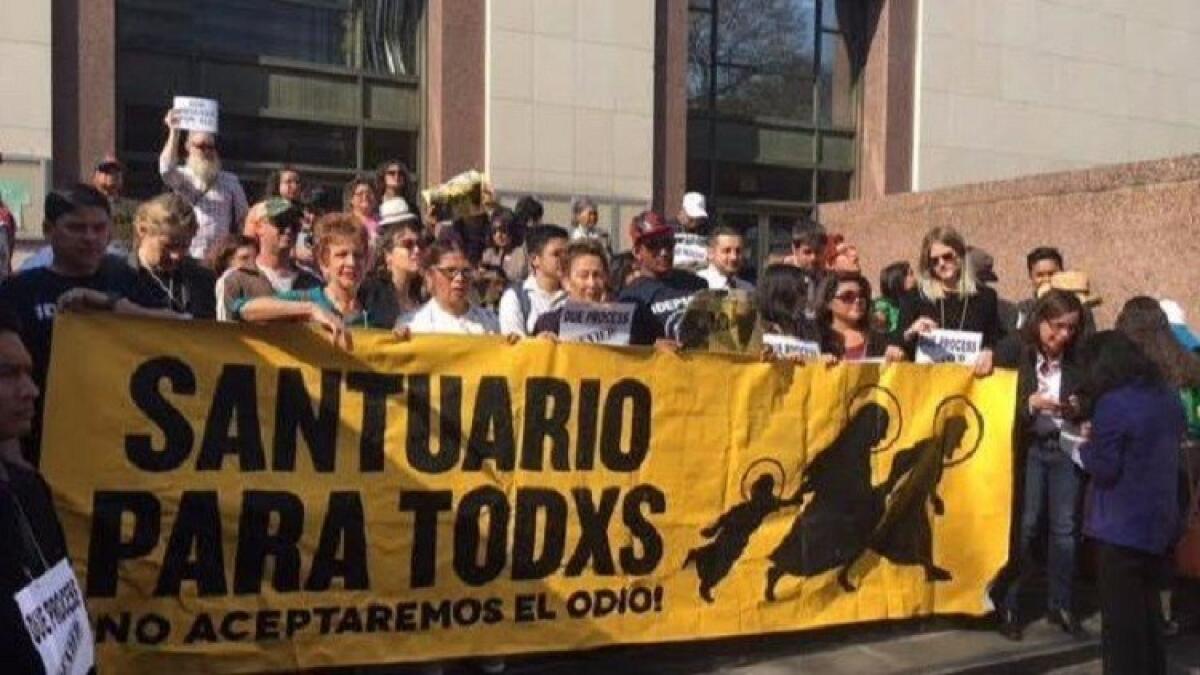A $10-million fund will help immigrants fight deportations. But should it help those with violent criminal convictions?

Fearing mass deportations under President Trump, Los Angeles Mayor Eric Garcetti and County Supervisor Hilda Solis stood together in December to unveil a $10-million fund to hire lawyers to defend local immigrants without legal status.
Modeled after programs in other cities, the L.A. Justice Fund will use city and county money and private donations to help those facing deportation proceedings.
But a proposal to bar immigrants with violent criminal convictions from using the fund is sparking protests from immigration advocacy groups, legal organizations and others in Los Angeles who argue that everyone has the right to an attorney.
The disagreement over who deserves legal representation is the latest issue to divide political leaders and progressive groups.
Some of the same groups fighting the L.A. Justice Fundâs criminal conviction provision also criticized Garcettiâs refusal to label Los Angeles a âsanctuary city.â
The debate over the L.A. Justice Fund mirrors the battle over a statewide legal fund under consideration by the state Legislature. That program, passed by the Senate earlier this month, also bars those with violent criminal convictions.
Garcetti spokesman George Kivork said in a statement the mayor wants the L.A. Justice Fund â which is expected to launch later this year â to prioritize children, heads of households and victims of domestic violence and human trafficking.
âThe L.A. Justice Fund is designed to provide legal resources and services to those immigrant Angelenos who are Americans by every measure except the papers they hold, and are facing deportation proceedings without a lawyer,â Kivork said.
Garcettiâs position comes after he pushed for second chances for those with criminal pasts, signing a law in December that restricts employers from asking job applicants about criminal convictions until after a conditional offer of employment has been made.
More than 1 million of the estimated 11 million immigrants in the country without legal status live in Los Angeles County, and advocates argue Los Angeles needs to be prepared for the threat of deportations.
Some anti-illegal immigration activists have criticized the L.A. Justice Fund, calling the program a waste of taxpayer dollars that interferes with the federal governmentâs immigration policies.
Under the fundâs rules, those convicted of or appealing a conviction for a violent felony as defined in subdivision (c) Section 667.5 of the California Penal Code, which includes crimes of murder, rape, and robbery, would be barred from accessing the fund.
Convictions for human trafficking, child abuse, domestic violence and pimping also could prevent someone from accessing the fund, according to the city of L.A.âs guidelines for the justice fund.
The cityâs criteria for the fund â L.A. will give a total of $2 million â differs slightly from the countyâs guidelines by giving the attorney the right to decide whether a defendant with a violent criminal felony conviction has a claim to fight deportation.
The city doesnât want to fund a legal case if thereâs no chance that the defendant will prevail, City Councilman Gil Cedillo said in an interview.
âWeâre being realistic about this,â Cedillo said.
In the criminal justice system, defendants are entitled to court-appointed attorneys if they canât afford one. But people facing deportation are not entitled to counsel.
Carmen Iguina, an attorney with ACLU of Southern California, argues the L.A. Justice Fund should be accessible to all immigrants, stating that everyone has the right to due process.
âWe shouldnât be saying that there are good and bad immigrants,â Iguina said.
Solis said she believes the county contribution â $1 million this year â is such a small amount that the county needs to prioritize who should be helped.
There has to be ârationality in terms of what our limitations are,â Solis said.
The supervisor also expressed frustration that sheâd been targeted by protesters, some of whom are comparing her position on the L.A. Justice Fund to Trumpâs position that he wants to deport âbad hombres.â
About 40 people gathered outside the supervisorsâ meeting Tuesday to protest the fundâs lack of universal access. The Board of Supervisors ultimately pulled a vote on the fund after failing to muster enough support to pass the motion.
County Supervisor Sheila Kuehl said in a statement the following day that sheâs concerned that the criminal conviction provision could deny legal help to those who have mistakenly been labeled as having such a conviction.
Immigration advocates cite similar programs in New York City that also use taxpayer dollars but donât bar those with criminal convictions.
Excluding those with violent criminal convictions is âdefining people by the worst things theyâve done,â said Steve Choi, executive director of the New York Immigration Coalition. âPeople have done their time. Why punish them again through the immigration system?â
A Solis spokeswoman said Friday that the Board of Supervisors vote on the L.A. Justice Fund hasnât been rescheduled. Itâs also unclear when the L.A. City Council will hear a similar motion on the fund.
At a committee hearing on the L.A. Justice Fund last month, Councilwoman Nury Martinez said she wanted to ensure that those convicted of âheinous crimesâ canât use the fund.
She pointed to her work fighting human traffickers in her San Fernando Valley district.
âFolks like that shouldnât have access to this type of money and shouldnât have access to this representation,â Martinez said.
Twitter: @dakotacdsmith
ALSO
One key way soggy California could save water for the next rainless days
LAPD officers expected to face more scrutiny over shootings with new rules
More to Read
Sign up for Essential California
The most important California stories and recommendations in your inbox every morning.
You may occasionally receive promotional content from the Los Angeles Times.











